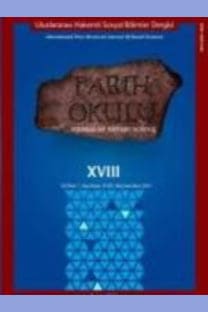SIRA DIŞI BİR EĞİTİM SÜRECİ: J. S. MİLL’İN ERKEN DÖNEM EĞİTİMİ
John Stuart Mill, 19. yüzyılda yaşamış en önemli İngiliz filozofu olarak kabul edilir. Jeremy Bentham’ın sistematize ettiği faydacı ahlak felsefesine, liberalizme, temsili hükümet sistemine, politik ekonomiye ve kadın haklarına sağladığı katkılar onun çok yönlü bir düşünür olduğunu göstermektedir. O, çok küçük yaşta başladığı eğitimi ile de dikkat çekici bir figürdür. Babası James Mill’in yönlendirmesi ve yönetimi ile şekillenen bu eğitim sürecinde Mill 3 yaşında Yunanca, 8 yaşında Latince öğrenirken 14 yaşına kadar çok kapsamlı bir felsefe, edebiyat, tarih, politik ekonomi ve hukuk koleksiyonunu orijinal dillerinden okuyarak özümsemiştir. Onun eğitim sürecini sıra dışı kılan etmenlerin başında babasının eğitim felsefesi gelmektedir. Buna göre, baba Mill eğitimin amacını mutluluğa ulaşma şeklinde belirlerken faydacılığı esas almıştır. John Locke’un deneyselciliği ile Robert Owen’ın çevreselci yaklaşımını temel prensipler olarak benimseyerek uygulama aşamasında Sokratik yöntem ve seküler eğitimi tercih etmiştir. Bu çalışma, J. S. Mill’in bir filozof olarak yetişmesini sağlayan bu eğitim sürecinin eğitim felsefesi açısından bir analizini yaparak günümüz eğitim yaklaşımlarına tarihsel ve felsefi bir örnek sunmayı amaçlamaktadır.
An Unusual Course of Education: Early Education of J. S. Mill
John Stuart Mill is considered the most important English philosopher of the 19th century. His contributions to the utilitarian moral philosophy systematized by Jeremey Bentham, liberalism, the representative government system, political economy, and women's rights show that he was a versatile thinker. He is also a remarkable figure with his own education which started at a very young age. In this educational course characterized by the direction and administration of his father James Mill, J. S. Mill learned Greek at the age of 3, Latin at the age of 8, and internalized a very comprehensive collection of philosophy, literature, history, political economy and law by the age of 14 by reading them in their original languages. One of the factors that makes his education process extraordinary is his father's philosophy of education. According to this, his father found the aim of education as reaching happiness in utilitarianism. Setting the empiricism of John Locke and the environmentalist approach of Robert Owen as the basic principles, he preferred the Socratic method and secular education in the application phase. This study aims to present a historical and philosophical example to today's educational approaches by making a philosophical analysis of this educational process that enabled J. S. Mill to grow up as a philosopher.
___
- Ball, T. (2000). The formation of character: Mill's "ethology" reconsidered. Polity, 33(1), 25–48. https://doi.org/10.2307/3235459
- Boghossian, P. (2006). Socratic Pedagogy, Critical Thinking, and Inmate Education. Journal of Correctional Education, 57(1), 42-63.
- Burston, W. H. (1969). James Mill on Education. Cambridge University Press.
- Capaldi, N. (2004). John Stuart Mill: A Biography. Cambridge University Press.
- Carbone, P. F. (1983). John Stuart Mill on Freedom, Education and Social Reform. The Journal of Educational Thought, 17(1), 2-11.
- Dewey, J. (2007). Deneyim ve Eğitim. (S. Akıllı, Çev.). ODTÜ Yayınclık.
- Finlay, G. (2017). Mill on Education and Schooling. C. Macleod, & D. E. Miller (Dü) içinde, A Companion to Mill (s. 504-517). Wiley Blackwell.
- Fox, C. (1882). Memories of Old Friends. Volume I. Elder Smith.
- Gulley, N. (1968). Plato's Theory of Knowledge. Methuen & Co Ltd.
- Guttek, G. L. (1988). Philosophical and Ideological Perspectives on Education. Allyn and Bacon.
- İsbir, E. (2018). Aydınlanma Döneminde Eğitim. 3. Uluslararası Felsefe, Eğitim, Sanat ve Bilim Tarihi Sempozyumu Tam Metin Bildiriler Kitabı, (s. 208- 215).
- Lawton, D., & Gordon, P. (2002). A History of Western Educational Ideas. Woburn Press.
- Locke, J. (1999). An Essay Concerning Human Understanding. The Pennsylvania State University.
- Mill, J. (1813). Essays on the Formation of Human Character. Philanthropist, 3(10), 93-119.
- Mill, J. (1815). Stewart's Philosophy of the Human Mind. British Review, 6(11), 170-200.
- Mill, J. (1878). Analysis of the Phenomena of the Human Mind, 2 Volumes. Longmans.
- Mill, J. (1969). On Education. Cambridge University Press.
- Mill, J. S. (1984). Inaugural Address. Collected Works of John Stuart Mill Volume 21 (s. 213-257).University of Toronto Press.
- Mill, J. S. (1986). The Education Bill. Collected Works of John Stuart Mill Volume 25 (s. 1222-1223). University of Toronto Press.
- Mill, J. S. (1988). Secular Education. Complete Works of John Stuart Mill Vol. 28 (s. 3-5). University of Toronto Press.
- Mill, J. S. (2004). Hürriyet Üstüne. (M. O. Dostel, Çev.). Liberte Yayınları.
- Mill, J. S. (2009). Autobiography. The Floating Press.
- Mill, J. S. (2017). Demokratik Yönetim Üzerine Düşünceler. (Ö. Orhan, Çev.). Pinhan Yayıncılık.
- Owen, R. (1991). A New View of Society and Other Writings. (G. Claeys, Dü.). Penguin Books.
- Politis, V. (2006). Aporia and Searching in the Early Plato. L. Judson, & V. Karasmanis (Dü) içinde, Remembering Socrates: Philosophical Essays (s. 88-109). Oxford University Press.
- Rosen, F. (2005). Socrates. D. Boucher, & P. Kelly (Dü) içinde, Political Thinkers: From Socrates to the Present (s. 40-53). Oxford University Press.
- Ryan, A. (2016). J. S. Mill. Routledge & Kegan PAul.
- Soltis, C. F. (2002). J. Dewey. J. W. Guthrie (Dü.) içinde, Encyclopedia of Education (s. 577-582). Macmillan Reference.
- West, H. R. (2004). An Introduction to Mill's Utilitarian Ethics. Cambridge University Press.
- Woodruff, P. (2011). Socrates and the New Learning. D. R. Morrison (Dü.) içinde, The Cambridge Companion to Socrates (s. 91-110). Cambridge University Press.
- ISSN: 1308-5298
- Başlangıç: 2008
- Yayıncı: Ahmet KARA
Sayıdaki Diğer Makaleler
BİLİM SANAT ENTEGRASYONUNDA BİYOSANAT VE ETİK SORUNSALI
Muhammet MEMİŞ, Nebahat Merve HİMOĞLU
İÇ GÖÇ VE TOPLUMSAL DEĞİŞMENİN TÜRK ROMANINA YANSIMASI
Nurefşan ESKİYURT, Emre CENGİZ
Türk Film ve Televizyon Dizilerinde Bulgar Karakterlerin Farklı Temsilleri: Sosyolojik bir Analiz
ANA HATLARIYLA GEÇ CUMHURİYET DÖNEMİ ROMA KOLONİZASYONU
HİNDİSTAN’DA TÜRKÇE VE TÜRK EDEBİYATI ÖĞRETİMİ VE YUNUS EMRE ENSTİTÜSÜ
FUTBOL TARAFTARLARININ KARŞIT GÖRÜŞE SAYGI VE ÖZ DENETİM DÜZEYLERİNİN İNCELENMESİ
